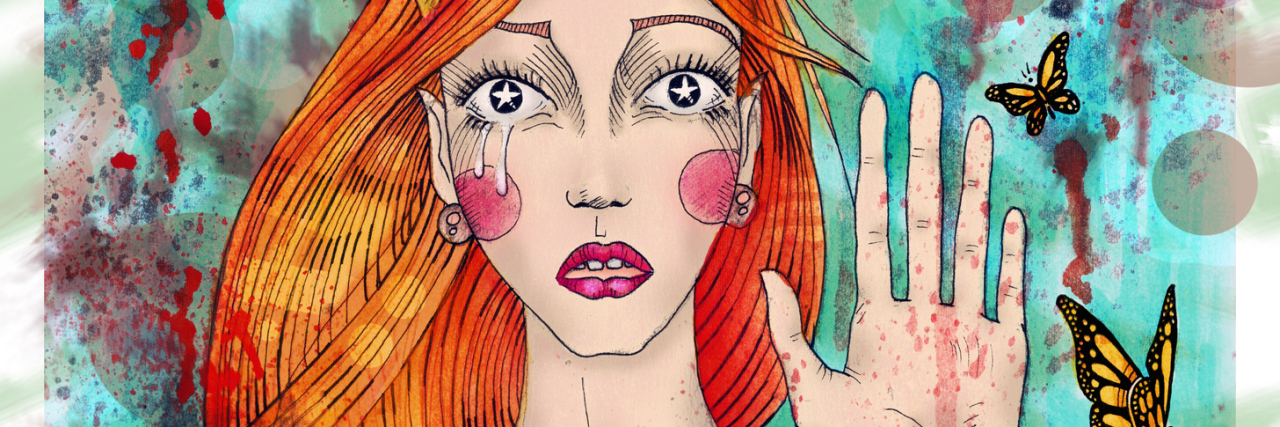Editor’s note: If you experience suicidal thoughts or have struggle with self-harm, the following post could be potentially triggering as it discusses suicide means. You can contact the Crisis Text Line by texting “START” to 741-741.
I thought about self-harming three times before I had made my morning first coffee. By my second, it was up to 10 times. This is a normal day for me. No, I’m not an “attention-seeking” 16-year-old. Nor am I in a hospital. I don’t even have a single cut on my body. I am nearly 30 and I have compulsive suicidal thoughts.
I don’t actually want to die. I tried once before I was 20. I’ve seen the pain left by friends and family suicides. During happier periods of my life, I had no thoughts at all about self-harm. So it’s alarming to find the thoughts back, and stronger than ever.
On bad days, I spend the day at my partner’s work. Being in a different environment and with him helps mute the thoughts a bit. As a way of letting him know when I was having a suicidal flash without saying words that invoke violence and panic, I told him my brain was being “stupid.”
“What’s wrong?” he asks.
“Oh I just have stupid brain.” I reply and we both know what it means. While I was with him, I told him about three occurrences of “stupid brain.”
“Again?” he exclaims. I’d only mentioned every third or fourth occurrence.
It’s not actually a conscious process. I can be doing something routine, mundane and normal like driving my car. Then an image flashes into my mind, like a glimpse into an alternate reality, a premonition. And I shake my head and it’s gone. On better days, the thoughts don’t bother me much. I shake it off and move on. On bad days, I lie in bed, painfully aware of where every blade in the house is, terrified that today would be the day I give in to the compulsions.
I once read that mental illness is like holding a glass of water. The glass isn’t heavy, it’s easy to hold at first. But the longer you hold it the more tired your arm gets and the glass feels heavier. Eventually the weight of the glass is too much for your tired arm and you must either put it down, or drop it. A year ago when the thoughts started, it was easy to push them aside, keep them to the back of my mind and not let them get to me. They were temporary and when life picked up, they would go away again. But now, now I pray each day that today is not the day I break. The visions more violent, more detailed.
But have you tried to explain to someone that you have thoughts about self-harming 10 times a day at least? They’ll lock you up. Put you in hospital or call you 20 times a day to ensure you are safe. Or they get angry.
“What will hurting yourself achieve?”
“Suicide is selfish!”
My therapist asks if my meds need upping.
So I maintain my mask of normality. As I walk in the supermarket, I don’t let on that I can almost feel what it would be like to self-harm. I drive my car pretending I am not anxious that I might veer it into a tree accidentally on purpose. The effort of keeping these thoughts as just thoughts is exhausting. It’s a constant battle with your own brain, battle lines are drawn — depression and anxiety vs. rationality and reality.
In desperation one day, I googled “I can’t control thoughts about suicide” and found a lot about obsessive-compulsive disorder. I don’t have OCD, but I understand now lots of my anxiety symptoms are common with some OCD symptoms. I don’t need to do things to know I haven’t hurt myself. I do sometimes make rules, count or like things just right.
I have no conclusion to this post, because it is not something I have solved, or a puzzle I have finished, packed up and put back into its box. This past week has been a glimpse of hope with the thoughts slightly less intense. I don’t know if the process of writing has helped or if my brains has slightly corrected itself. Whatever it is, a brief respite from the thoughts makes me certain I can hang on to that glass of water a little bit longer.
A version of this post appeared on This Ephemeral Blog
If you or someone you know needs help, visit our suicide prevention resources page.
If you need support right now, call the National Suicide Prevention Lifeline at 1-800-273-8255 or text “START” to 741-741.
We want to hear your story. Become a Mighty contributor here.
Getty Images photo via sSplajn

